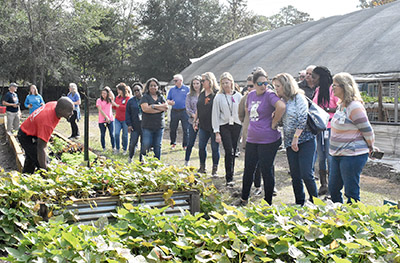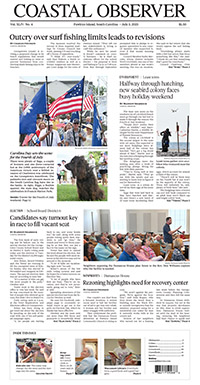Nonprofits
Food programs work to provide more greens

There’s an old saying: you are what you eat.
“Unhealthy food does not contain the nutrients that our bodies need to function properly … [or] the nutrients that we need for our physical and mental health,” said Dr. Michelle McCauley, a family medicine physician for Tidelands Health. “A lot of patients just don’t know what foods are healthy and what aren’t.”
The vast majority of the patients at the Smith Medical Clinic, which provides free medical care for the working poor, suffer from diabetes, hypertension or high cholesterol and don’t have access to foods that are good for them, like fish and vegetables.
“They tend to eat a lot of fast food,” said Pat Ames, clinic director. “I think there is a big disparity because food is so expensive, and, of course, a lot of people when they’re hungry they’re going to eat on the run.”
The clinic, which is on the campus of Holy Cross-Faith Memorial Episcopal Church, keeps diabetic educators and dietitians on staff to teach patients about healthier eating and refers them to the Baskervill Food pantry, which is right next door.
Along with distributing food – including vegetables from an onsite garden – to walk-in clients, the pantry has expanded its operations. Baskervill supports Blessing It Forward, a program that distributes groceries to people living in areas of the county that are considered “food deserts,” which means there isn’t a grocery store within 10 miles. It was started by Renee Ford, who delivers more than 100 bags of groceries every week to residents in the western part of the county.
“So far it’s been very good, and people have been very appreciative of us being out there,” said Nancy Cave, co-coordinator of the pantry.
Carolina Human Reinvestment, a Georgetown-based mentoring program for at-risk youth, started a community garden on Petigru Drive in 2020 to provide food to families in need, and programs that combat hunger.
Since April of 2021, more than 5,000 pounds of food from the outdoor beds has been distributed, according to Giany Guedjo, executive director of the nonprofit. Thousands of pounds of herbs and vegetables have been also distributed from the beds inside the garden’s greenhouse.
The garden also supplies produce to FoodShare Georgetown, which is a branch of FoodShare South Carolina. The mission of the nonprofit, which operates in 19 counties, is to increase access to, and knowledge and consumption of, fruits and vegetables in communities without access to grocery stores.
The success of the garden has attracted attention at the state level.
Members of the S.C. Department of Health and Environmental Control’s Pee Dee regional leadership team visited Pawleys Island last month to hear Guedjo’s story and get tips on supporting community gardens in their areas.
“Community gardens help reduce food insecurity within neighborhoods, provide local access to healthy foods, promote sustainable agriculture, and limit certain household waste through community composting programs,” said Jim Bruckner, DHEC’s Pee Dee Region health director. “Poor nutrition and obesity are a problem in many urban and rural communities across our state, and having community gardens can improve nutrition through the consumption of locally grown fruits and vegetables.”
McCauley said fresh food is always better than anything in a can.
“The big deal with canned foods is the sodium content,” she added. “It’s important to watch how much sodium you’re taking in these frozen meals and canned foods.”
Good foods include grilled or baked lean meats, whole grain breads and fruits and vegetables. McCauley cautioned that some fruits – like watermelon, bananas and oranges – have a lot of sugar in them.
McCauley tells her patients to shop around the perimeter of the grocery store, where the whole foods, vegetables and fresh fruits are.
Foods to avoid include anything with carbs, like bread (including biscuits and pancakes), pasta and rice; sugary foods; fried foods; and foods high in trans fats and saturated fats.
“If we can get people to eat less sugars and fat, it will help combat obesity and diabetes,” McCauley said. “These foods can also lead to heart disease as well. Extra fat can lead to our arteries containing plaque and buildup, which can cause lots of problems.”
McCauley also recommends checking the calories and amount of sugar, sodium and trans fats in the food you’re buying.
A 2021 study by Coastal Carolina University found that 11 percent of Georgetown County residents suffer from food insecurity, which is defined as a lack of consistent access to enough food for every person in a household to live an active, healthy life.
Food insecurity is at its worst in the southern and western parts of Georgetown County.
Tidelands Health is working to help people live healthier lives by partnering with public and private organizations through LiveWell Georgetown County.
“Food insecurity is definitely going to be more concerning in more of the rural areas,” said Amanda Cohen, manager of wellness for Tidelands Health. “That is particularly why we definitely have this LiveWell Georgetown coalition because of Georgetown being a community of rural areas where there’s a lack of transportation and grocery stores are not close by.”
The initiative is also working on education programs. Cohen said it’s great when people receive fresh food, but if they don’t know how to prepare things, they won’t be able to eat them.
LiveWell tackles not only getting people to eat better, but also be more active.
“It’s a big task, but we’re up for the task. The coalition is up for the task,” Cohen said. “We have some really passionate community members [with] the same mission. We call that our common health goal. They’re very dedicated to helping people live healthier lives and helping those that can’t afford fresh food.”
Georgetown County residents have three opportunities to pick up a free Thanksgiving meal on Nov. 24.
• The Knights of Columbus will be serving its 37th annual meal from 10 a.m. to noon at St. Mary’s Catholic Church parish hall.
The church is located at 317 Broad St. in Georgetown, near the intersection with Highmarket Street.
• Aunny’s Country Kitchen will be serving from 11 a.m. to 4 p.m.
The restaurant is located at 926 Front St., near the intersection with King Street.
• Low Country Community Church is hosting a free meal from noon until 3 p.m.
The church is located at 4430 Murrells Inlet Rd. behind VFW Post 10420.




